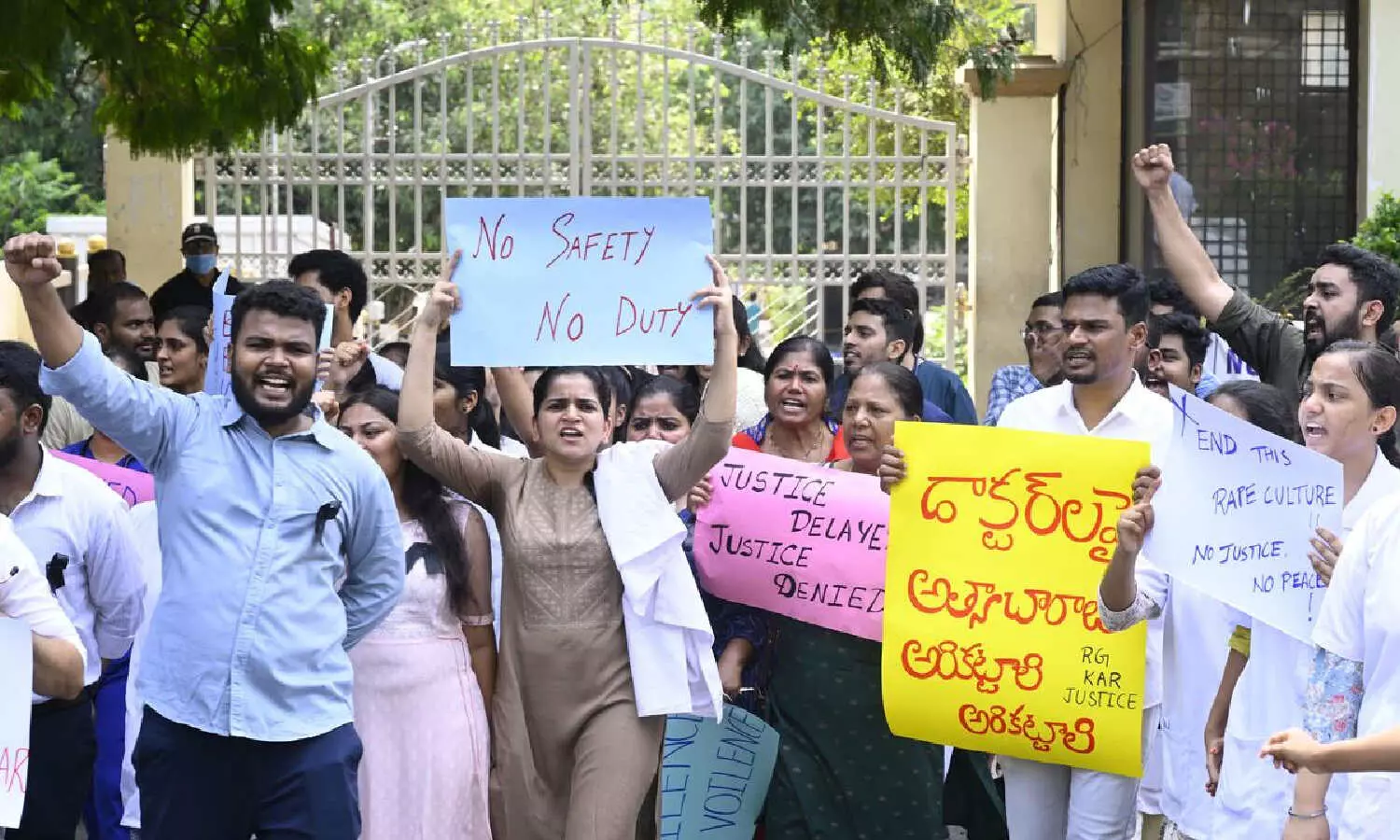Transport for female professionals to reducing duty hours: TTGDA submits memorandum to NTF
Telangana doctors insist on infrastructure improvements, enhanced security measures, and better administrative practices in hospitals
By Anoushka Caroline Williams
Telangana doctors recent protests across the state, doctors demand enhanced security and better administration in hospitals
Hyderabad: Telangana Teaching Government Doctors Association (TTGDA) has submitted a detailed representation to the National Task Force (NTF), Government of India, addressing concerns related to the safety and security of healthcare personnel across the country.
The representation highlights the pressing need for infrastructure improvements, enhanced security measures, and better administrative practices within healthcare facilities.
Infrastructure and Human Resources
The association emphasized the need for robust infrastructure and adequate manpower in healthcare facilities.
“Basic amenities in working areas, especially for doctors and staff, are essential," the representation said.
It also calls for transport facilities during night duties for female healthcare professionals and a reduction in duty hours to 12 hours. Additionally, it suggests the segregation of Outpatient (OP) and Inpatient (IP) departments to streamline operations.
Security Measures
Addressing security concerns, the TTGDA has proposed several measures to ensure the safety of healthcare professionals. The representation suggests installing the Hawk Eye app on mobile phones and establishing a centralized alarm system in hospitals to alert security personnel. It also recommends round-the-clock security in major hospitals, with a dedicated team comprising residents, senior faculty, and supporting staff for crisis management.
Dr. Kiran Madahala, Secretary General of TTGDA, highlighted the importance of a separate budget allocation for security measures. "Regular checking and training by regulatory authorities on security issues, including the functioning of CCTV cameras and security staff, is crucial," he stated.
The association also advocates for the creation of a separate cell to handle harassment cases, with sufficient representation from junior doctors, students, senior doctors, women doctors, and paramedical staff. The presence of regular police at key areas within hospitals and night patrols by local police stations are also recommended.
Administrative Enhancements
The TTGDA calls for the strengthening of the Department of Hospital Administration, with mandatory night rounds by authorities. "Involvement of all stakeholders in decision-making, including representatives from Junior Doctors' Associations (JUDA), Resident Doctors' Associations (RDA), Government Doctors' Associations (GDA), students, and paramedical staff, is necessary to improve hospital management," the association suggested.
To further enhance workplace safety, the association proposes the implementation of anti-ragging norms, mandatory self-defense classes for doctors, and interactive workshops on the Prevention of Sexual Harassment (POSH) for all employees. They also recommend studying best practices from developed countries in terms of security.
Specific Provisions
In the representation, the TTGDA advocates for the establishment of an Indian Medical Service, similar to the civil services, to ensure quick and effective actions. The association also suggests the creation of a national toll-free helpline to address violence and harassment cases against healthcare professionals, along with a portal for reporting such incidents.
"Doctors in the public sector should be paid decently with sufficient break periods and provisions for vacation," the representation urges, emphasizing the importance of work-life balance for healthcare workers.
General Recommendations
The TTGDA strongly recommends the implementation of a central protection act, which should be uniformly enforced across the country. They also suggest modifying Section 106(1) of the Bharatiya Nyaya Sanhita to exclude medical negligence, allowing doctors to work without fear of legal repercussions.
The association concludes with a call to streamline the District Residency System, which, they argue, puts young doctors, particularly women, at risk. The TTGDA hopes that these recommendations will be seriously considered and implemented to safeguard the well-being of healthcare professionals nationwide.